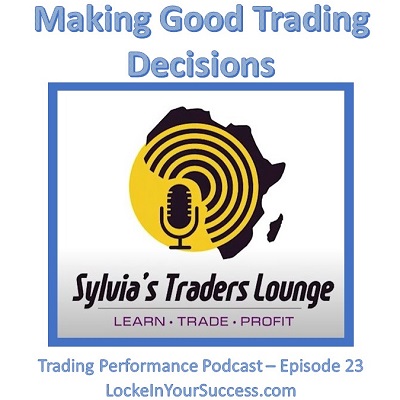
A huge thank you to Sylvia’s Traders Lounge for inviting me for the making good trading decisions interview. I am very grateful for the opportunity and really enjoyed sharing this important topic with her, her crew, and her listeners. And now, I’m excited to share this full length interview with all of you in episode 23 of the Trading Performance Podcast! Click here or in the video below to discover in detail how to make good trading decisions!
When making a trading decision there are many factors that should be considered to make a good one. To start there needs to be an understanding of what determines the marketable price of the asset you are trading which boils down to what people are willing to pay for it and what people are willing sell it for.
How do we determine what a good price is? It begins with looking at the most basic motivational factors of all human behavior which is known as the motivational triad. It consists of these human tendencies:

- To avoid pain
- To seek pleasure
- To conserve energy
These three human tendencies are why most people find themselves unconsciously looking for the Holy Grail trade or the magic trading strategy or the magic indicator where they can make money without an over abundance of work or have to risk being wrong.
As a result, traders will often chase these Holy Grail indicators and strategies even when trader intellectually knows they don’t exist.
The prospect of making a lot of money is associated with intense pleasure and the prospect of losing money is associated with intense pain.
This being the case when traders see an asset going up they’ll typically associate that with the asset continuing to go up because of recency bias, and that being the case, they see an opportunity to make money and they feel compelled to enter the position or stay in an existing position. You can call it greed or the fear of missing out but either way the emotion prompts people to react to it. When that happens this is going to drive prices much higher than they should be and create a market that is too expensive.
On the flip side once the asset price starts to drop, and as the pain of losses are increasing, traders often get scared, not so much of the loss itself but rather the meaning that they’ve applied to the anticipation of the potential loss. At that point our natural tendency is to avoid that pain at all costs by either panicking out of the position, or by holding and desperately hoping the position will come back.
The market makers know all about these tendencies and use them all the time.
Do you ever feel like someone is watching you trade and knows what you are doing when you trade? Most traders would answer yes. That is the market makers taking advantage of the herd mentality.
Break out from the herd and use this in-depth interview about making good trading decisions to learn strategies to improve your trading performance.


Leave a Reply
You must be logged in to post a comment.